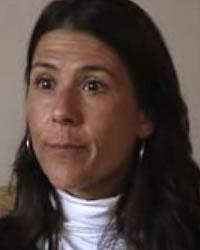No Holds Barred
 It’s strange to hear Nadia Wehbe talk about balance. Because when she
does something, she does it 100 per cent, all in, no holds barred.
It’s strange to hear Nadia Wehbe talk about balance. Because when she
does something, she does it 100 per cent, all in, no holds barred.When she decided four years ago to get involved with The Palestine Children’s Relief Fund (PRCF), for example, she didn’t start with a few hours a week raising money or giving support. Not Nadia. She went directly to Palestine to see for herself what was needed “on the ground.”
“Going to Palestine was great for me. You never understand conflict
like that until you see it,” she says. “You think people in war are
dying of bullets, or they’re dying of shrapnel, or they’re dying of
hunger. But they’re not. They’re dying of depression. It’s miserable,
absolutely miserable. It’s grey, it’s dirty, everything in their shops
is from the seventies, they live in camps. It’s really suffocation.
Very, very slow suffocation.”
When a local man invited her to his one-room home where he, his wife and several children lived in squalor, she was touched. Then and there, she took a vow to be an agent for change.
“After that I just thought I’d do anything really,” she affirms. “And it’s not about politics, it’s just about these people living, a boy who has lost his legs and has a wheelchair, but has no ramp to get out of his house, so he’s stuck there all day. Nobody will build a ramp because they don’t have enough money to buy the cement. It’s as simple as that. So it was really great just to see it and then to say “ok, this is what I want to do.”
US journalist founded PCRF
Nadia had discovered PCRF through its founder Steve Sosebee who was introduced to her through a friend of her brother. And it was her contact with Sosebee that led to her initial trip to Palestine.
Sosebee, an American journalist who was covering Palestine in the 1990s, and who came to the aid of young boy with a gunshot wound to his leg, founded the PCRF 17 years ago. According to Nadia, he searched for doctors and hospitals, raised funds for air tickets, and even took the youth into his own home for six months. Since then, the PRCF has helped thousands of children in need of medical attention.
“PRCF had sponsored and organised all kinds of surgery – open heart surgery, orthopedics, plastic surgery, everything. Sometimes the doctors go to Palestine to the children. Sometimes the children leave Palestine to go to the doctors in other countries,” Nadia says. “One Dubai-based surgeon took non-paid leave to go to Palestine, where he did 20 surgeries in 10 days. It was wonderful.”
According to the PRCF website, surgeons from Italy, New Zealand, United States, United Kingdom and Germany all traveled to Palestine to treat children there, in the first quarter of 2008 alone. And the work isn’t confined solely to Palestine or to Palestinian children.
Five-year-old Iraqi Teeba Farhat is in Cleveland, Ohio (thanks in part to PCRF), where she is receiving free plastic surgery for facial deformities. (Download people : teeba.pdf below to see Teeba's story)
While surgery seems to get the most attention, perhaps because it’s the most dramatic, PCRF helps children with all kinds of diseases and medical problems Children with diabetes, for example, who need medicine, but their families can’t afford it. Or children who have epilepsy, or who need blood transfusions, all are eligible for PCRF help – all of it privately funded.
Getting more than you give
Nadia says charity work is as much about the getting as it is about
the giving, even though she says she often works harder on the charity
than she does on her job.
“Every aspect of volunteering for PCRF is just SO rewarding. I love
everything about it – the people I meet, the ones who volunteer, the
doctors who work with us, the people who give us money….people of all
different nationalities and I love them all for whatever they give to
us.”
“I meet Palestinians who are in need, who come from Palestine and don’t
have all the luxuries or even the basic necessities we have here,” she
says. “They look at us as rich people – and we are richer people than
them, much richer, at least in terms of material wealth. It’s good to
be reminded of that, to put things in perspective.”
Overall though, what Nadia most appreciates about her charity work is the fact that it brings balance into her life.
“I love the balance that working for PCRF puts into my life. I mean,
you know Dubai, we go to nice restaurants, we travel, we lead
privileged lives,” Nadia says. “I need to give back to feel human. I
need to give back to feel my life is worth it. I have a good life, I’ve
had ups and downs, I’ve had hard times, I’ve had good times.”
“Giving back makes me realise we’re all in the same boat. There’s ups,
there’s downs, some people have it worse, some people have it better,
but the balance, seeing those kids. I love it. I love what it gives
me,” she smiles. “It makes me feel good about myself. It’s very
selfish. It really makes me feel good about myself. I feel “yep, done
that, I’m alright for another few months, done my bit.”
And her final piece of advice?
“I think ‘go do it’, you know, ‘do it’. Don’t just do charity, do
something that makes you feel good. I think it just takes you so far,
so very far.”